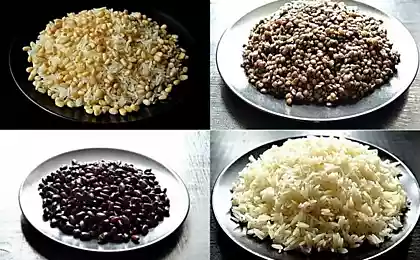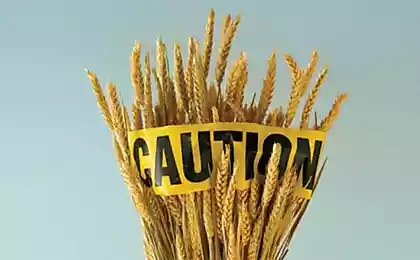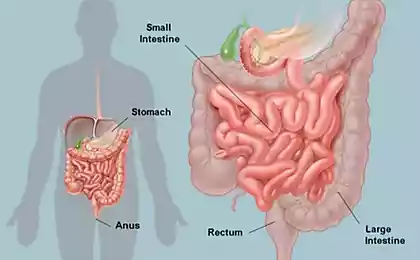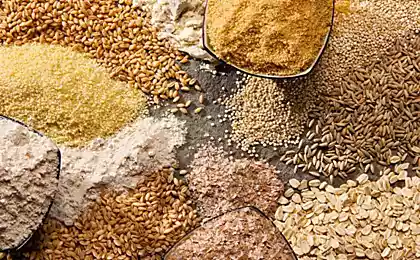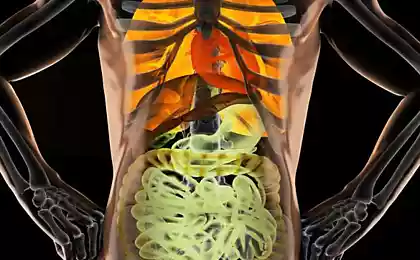539
Why people no longer digest wheat. Gluten to do with it!
More Americans suffer from intolerance to wheat protein gluten, refuse of wheat and switching to a gluten-free diet. Host of the popular blog The Healthy Home Economist, a mother of three and author of books on healthy eating Sarah Pope tried to figure out why this is happening. What she found led her in horror. I receive a lot of letters from American readers who are experiencing problems with gluten intolerance. They wonder why they have not manifested allergic reactions and there is the usual digestive problems if they try meals with wheat protein away from home, for example, pasta on vacation in Italy.
Confused parents wondering why wheat consumption is causing their children autoimmune reaction in some cases and not in other causes. I tried to understand why my husband was quietly eating the wheat products that I cook at home, but has problems with digestion, barely touching his buns in the restaurant.
Clearly, wheat is something wrong, but few people think, what's going on here. The problem is much broader confrontation between natural and non-natural, gluten and hybridization. After all, some people even products from traditionally grown wheat does not cause problems if they eat them in other parts of the world.
What's wrong with wheat? For a long time I've seen the only reasonable explanation of these facts, the American wheat is probably genetically modified and added to food products across North America.
I understand that it is definitely not gluten or wheat hybridization. Gluten and hybrids are eaten for thousands of years. It is simply illogical that in the last 5-10 years, people suddenly began to experience problems with them. I tried to look into the matter yourself. And what I found led me in horror.
The good news is that toxic wheat in the United States was not due to the fact that she secretly genetically modified, why I was so nervous. (Thank you, Lord!). The bad news is that the problem lies in the method of growing and harvesting wheat in traditional farms.
Now you'd better sit down. From the information you just read, many people are horrified and crying.
The U.S. is treating the wheat herbicide "roundup" a few days before harvest. This allows you to harvest more grain with less effort and sooner.
"Roundup" contains a lethal ingredient glyphosate. For the first time to use this herbicide on fields to dry grain before harvest proposed in the early 1980s. Over the last 15 years it has become a matter of habit: now at about 30% of the total produce "roundup" is used in traditional agriculture as a drying agent 7-10 days before harvest.
According to Professor Massachusetts Institute of technology Stephanie Seneff deeply studied this problem, I recently saw her presentation at the conference on nutrition in Indianapolis – as a result of drying of crops with glyphosate most of the wheat in the U.S. now infected with this substance. This treatment wheat yields more seeds, slightly increasing the yield. "Glyphosate penetrates into the seeds when the plant dies. Dying, it gives more seeds," says Seneff.
According to the Department of agriculture of the US in 2012, 99% of durum wheat, 97% of spring wheat, and 61% of winter crop was treated with herbicides. This percentage has increased compared to 1998 when such treatment were 88% of durum wheat, 91% for spring wheat and 47% of winter.
The use of "roundup" allows to speed up the ripening of green areas of the field.
That's what this practice says farmer Keith Lewis: "I grow wheat for 50 years, and one of the most common techniques is the use of "roundup" before the harvest. "Roundup" is allowed to use to destroy the weeds before the harvest. Developer "roundup" Monsanto argues that as a result of spraying the plants with the moisture of the grains above 30%, the plant absorbs "roundup" of grain. Farmers like this practice because it can kill the plant, thereby providing an early harvest".
A wheat field often ripens unevenly. And the use of "roundup" before harvesting can accelerate the maturation of green field sites so they caught up with the ripe. As a result of "roundup" penetrates into the less Mature grains and into the crop.
People who use products made from such grain, of course, absorb the smallest particles and "roundup". It is noteworthy that the malted barley from which beer is brewed, not allowed to sale, if before the harvest of plants treated with "roundup". Same story with lentils and peas. A wheat – sell without a problem. I have such agricultural practices are seriously concerned, and would disturb and all consumers of products containing wheat.
Here is what the farmer Seth Woodland, owner of the farm Woodland and Wheat in Idaho, on the application of herbicides for drying of wheat: "This is a bad practice. A lot of my friends follow it, and it's sad. Luckily, not all of us run a household this way. As a farmer and President of the company I am proud to say that we never treated our wheat "roundup"!"
This practice is common not only in the United States. According to a report by the British food standards Agency, in the application of "roundup" as desiccant, glyphosate residues are regularly detected in samples of bread. However, other European countries have already reacted to the problem seriously. In the Netherlands the use of "roundup" is completely forbidden, soon will follow and France.
The table below shows the sharp rise in the treatment with glyphosate wheat in the United States since 1990 year and the incidence of celiac disease (the gluten intolerance). The table is taken from a study published in December 2013 in the journal Interdisciplinary Toxicology. The study discusses how glyphosate causes autoimmune diseases. Let's not forget that wheat is not genetically modified and has not, like GMO corn or GMO soy, Roundup Ready trait, that is resistant to the damaging effects of roundup. Therefore, treatment with glyphosate just kill the wheat.
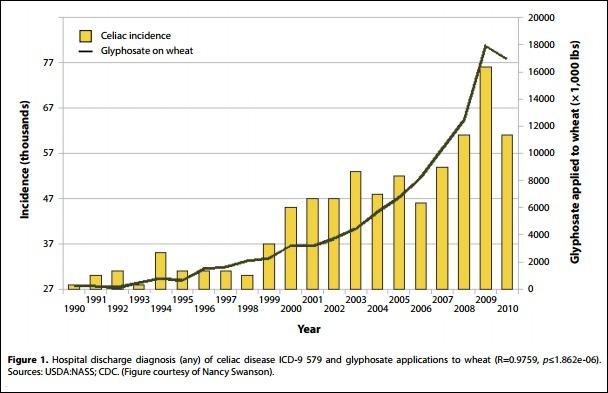
Major manufacturers herbicides claim that glyphosate is harmless to humans. Believes that the majority of farmers – after all, sales of "roundup" even recklessly drank it during presentations! But the fact that "roundup" does not kill instantly does not mean that it is non-toxic. This clearly proves that Anthony Samsel and we already know Stephanie Seneff from MIT, whose research on this topic published in the journal Entropy.
As it turned out, the active ingredient of "roundup" destroys the essential shikimate way for the synthesis of key amino acids, which carry the beneficial intestinal bacteria known as probiotics. They ensure patency of the gastrointestinal tract (preventing the development of autoimmune disease), synthesize vitamins and provide the basis for building a strong immune system.
"Roundup" undermines the functioning of beneficial bacteria in the stomach, causing the permeability of the intestinal wall and, consequently, the manifestation of symptoms of autoimmune diseases.
Glyphosate also inhibits the production of cytochrome P450 enzymes (CYP) in the intestinal flora. The CYP enzymes are critical to human biology because neutralize many foreign chemicals, xenobiotics, exposure to which we are exposed in everyday modern environment. If these enzymes are impaired, people poisoned with glyphosate are more vulnerable to the destructive effect of other chemicals and toxins they encounter. Worst of all, the negative impact of glyphosate is formed slowly and without symptoms for months and even years. Gradually, the inflammation takes the cellular system of the body. The consequences of this systemic inflammation disease and disorder associated with the Western lifestyle:
Gastrointestinal disorders
Obesity
Diabetes
Heart disease
Depressive syndrome
Autism
Infertility
Cancer
Multiple sclerosis
Alzheimer's Disease
This list goes on and on...
Avoid toxic wheat at any price that is important: it is absolutely necessary to avoid conventional wheat in the United States, even if you are not allergic to gluten or sensitivity to wheat. More wheat is treated with glyphosate, and it is closely connected with the growing number of patients diagnosed with celiac disease or can not tolerate gluten. Alas, not all the patients start to improve after excluding gluten from their diets – aggressive effects of the environment can also cause similar symptoms – says Professor Seneff. The impact of glyphosate on our bodies so inconspicuous that no symptoms today doesn't mean anything. Even if you have no problems with wheat now, they will appear in the future, if you continue to eat the product produced according to modern technologies.

How to protect yourself when eating products containing wheat
Obviously, if you already had hypersensitivity or Allergy to wheat, it should be avoided. Point. But if you don't have celiac disease or sensitivity to gluten and want to eat safely, can do the same as we do at home. We use only natural high quality wheat from a proven company. From it we prepare bread, pancakes, cookies, etc. But when we eat away from home or bought in a store, the products of the traditional wheat-reject flatly. This is despite the fact that we are not allergic to gluten, and the like – yet.
I firmly believe if we did nothing, then at some point in all of our family there would be sensitivity to wheat or autoimmune disease in one form or another due to the toxic principle of production and of residues of glyphosate that are found in traditional wheat products. But other plants too dry "roundup" before the harvest: barley, sugar cane, rice, seeds, dried beans and peas, sweet potato, sugar beet and so on. To protect yourself from modern, man-made disasters, there is only one way out – to buy these products only from farmers who work in friendly to the environment technologies. published
Author: Sarah Pope, The Healthy Home Economist.
P. S. And remember, only by changing their consumption — together we change the world! ©
Join us in Facebook and in Vkontakte, and we're Classmates
Source: lavkagazeta.com/ekologiya/pochemu-lyudi-perestali-perevarivat-pshenicu-glyuten-ne-prichem
Confused parents wondering why wheat consumption is causing their children autoimmune reaction in some cases and not in other causes. I tried to understand why my husband was quietly eating the wheat products that I cook at home, but has problems with digestion, barely touching his buns in the restaurant.
Clearly, wheat is something wrong, but few people think, what's going on here. The problem is much broader confrontation between natural and non-natural, gluten and hybridization. After all, some people even products from traditionally grown wheat does not cause problems if they eat them in other parts of the world.
What's wrong with wheat? For a long time I've seen the only reasonable explanation of these facts, the American wheat is probably genetically modified and added to food products across North America.
I understand that it is definitely not gluten or wheat hybridization. Gluten and hybrids are eaten for thousands of years. It is simply illogical that in the last 5-10 years, people suddenly began to experience problems with them. I tried to look into the matter yourself. And what I found led me in horror.
The good news is that toxic wheat in the United States was not due to the fact that she secretly genetically modified, why I was so nervous. (Thank you, Lord!). The bad news is that the problem lies in the method of growing and harvesting wheat in traditional farms.
Now you'd better sit down. From the information you just read, many people are horrified and crying.
The U.S. is treating the wheat herbicide "roundup" a few days before harvest. This allows you to harvest more grain with less effort and sooner.
"Roundup" contains a lethal ingredient glyphosate. For the first time to use this herbicide on fields to dry grain before harvest proposed in the early 1980s. Over the last 15 years it has become a matter of habit: now at about 30% of the total produce "roundup" is used in traditional agriculture as a drying agent 7-10 days before harvest.
According to Professor Massachusetts Institute of technology Stephanie Seneff deeply studied this problem, I recently saw her presentation at the conference on nutrition in Indianapolis – as a result of drying of crops with glyphosate most of the wheat in the U.S. now infected with this substance. This treatment wheat yields more seeds, slightly increasing the yield. "Glyphosate penetrates into the seeds when the plant dies. Dying, it gives more seeds," says Seneff.
According to the Department of agriculture of the US in 2012, 99% of durum wheat, 97% of spring wheat, and 61% of winter crop was treated with herbicides. This percentage has increased compared to 1998 when such treatment were 88% of durum wheat, 91% for spring wheat and 47% of winter.
The use of "roundup" allows to speed up the ripening of green areas of the field.
That's what this practice says farmer Keith Lewis: "I grow wheat for 50 years, and one of the most common techniques is the use of "roundup" before the harvest. "Roundup" is allowed to use to destroy the weeds before the harvest. Developer "roundup" Monsanto argues that as a result of spraying the plants with the moisture of the grains above 30%, the plant absorbs "roundup" of grain. Farmers like this practice because it can kill the plant, thereby providing an early harvest".
A wheat field often ripens unevenly. And the use of "roundup" before harvesting can accelerate the maturation of green field sites so they caught up with the ripe. As a result of "roundup" penetrates into the less Mature grains and into the crop.
People who use products made from such grain, of course, absorb the smallest particles and "roundup". It is noteworthy that the malted barley from which beer is brewed, not allowed to sale, if before the harvest of plants treated with "roundup". Same story with lentils and peas. A wheat – sell without a problem. I have such agricultural practices are seriously concerned, and would disturb and all consumers of products containing wheat.
Here is what the farmer Seth Woodland, owner of the farm Woodland and Wheat in Idaho, on the application of herbicides for drying of wheat: "This is a bad practice. A lot of my friends follow it, and it's sad. Luckily, not all of us run a household this way. As a farmer and President of the company I am proud to say that we never treated our wheat "roundup"!"
This practice is common not only in the United States. According to a report by the British food standards Agency, in the application of "roundup" as desiccant, glyphosate residues are regularly detected in samples of bread. However, other European countries have already reacted to the problem seriously. In the Netherlands the use of "roundup" is completely forbidden, soon will follow and France.
The table below shows the sharp rise in the treatment with glyphosate wheat in the United States since 1990 year and the incidence of celiac disease (the gluten intolerance). The table is taken from a study published in December 2013 in the journal Interdisciplinary Toxicology. The study discusses how glyphosate causes autoimmune diseases. Let's not forget that wheat is not genetically modified and has not, like GMO corn or GMO soy, Roundup Ready trait, that is resistant to the damaging effects of roundup. Therefore, treatment with glyphosate just kill the wheat.

Major manufacturers herbicides claim that glyphosate is harmless to humans. Believes that the majority of farmers – after all, sales of "roundup" even recklessly drank it during presentations! But the fact that "roundup" does not kill instantly does not mean that it is non-toxic. This clearly proves that Anthony Samsel and we already know Stephanie Seneff from MIT, whose research on this topic published in the journal Entropy.
As it turned out, the active ingredient of "roundup" destroys the essential shikimate way for the synthesis of key amino acids, which carry the beneficial intestinal bacteria known as probiotics. They ensure patency of the gastrointestinal tract (preventing the development of autoimmune disease), synthesize vitamins and provide the basis for building a strong immune system.
"Roundup" undermines the functioning of beneficial bacteria in the stomach, causing the permeability of the intestinal wall and, consequently, the manifestation of symptoms of autoimmune diseases.
Glyphosate also inhibits the production of cytochrome P450 enzymes (CYP) in the intestinal flora. The CYP enzymes are critical to human biology because neutralize many foreign chemicals, xenobiotics, exposure to which we are exposed in everyday modern environment. If these enzymes are impaired, people poisoned with glyphosate are more vulnerable to the destructive effect of other chemicals and toxins they encounter. Worst of all, the negative impact of glyphosate is formed slowly and without symptoms for months and even years. Gradually, the inflammation takes the cellular system of the body. The consequences of this systemic inflammation disease and disorder associated with the Western lifestyle:
Gastrointestinal disorders
Obesity
Diabetes
Heart disease
Depressive syndrome
Autism
Infertility
Cancer
Multiple sclerosis
Alzheimer's Disease
This list goes on and on...
Avoid toxic wheat at any price that is important: it is absolutely necessary to avoid conventional wheat in the United States, even if you are not allergic to gluten or sensitivity to wheat. More wheat is treated with glyphosate, and it is closely connected with the growing number of patients diagnosed with celiac disease or can not tolerate gluten. Alas, not all the patients start to improve after excluding gluten from their diets – aggressive effects of the environment can also cause similar symptoms – says Professor Seneff. The impact of glyphosate on our bodies so inconspicuous that no symptoms today doesn't mean anything. Even if you have no problems with wheat now, they will appear in the future, if you continue to eat the product produced according to modern technologies.

How to protect yourself when eating products containing wheat
Obviously, if you already had hypersensitivity or Allergy to wheat, it should be avoided. Point. But if you don't have celiac disease or sensitivity to gluten and want to eat safely, can do the same as we do at home. We use only natural high quality wheat from a proven company. From it we prepare bread, pancakes, cookies, etc. But when we eat away from home or bought in a store, the products of the traditional wheat-reject flatly. This is despite the fact that we are not allergic to gluten, and the like – yet.
I firmly believe if we did nothing, then at some point in all of our family there would be sensitivity to wheat or autoimmune disease in one form or another due to the toxic principle of production and of residues of glyphosate that are found in traditional wheat products. But other plants too dry "roundup" before the harvest: barley, sugar cane, rice, seeds, dried beans and peas, sweet potato, sugar beet and so on. To protect yourself from modern, man-made disasters, there is only one way out – to buy these products only from farmers who work in friendly to the environment technologies. published
Author: Sarah Pope, The Healthy Home Economist.
P. S. And remember, only by changing their consumption — together we change the world! ©
Join us in Facebook and in Vkontakte, and we're Classmates
Source: lavkagazeta.com/ekologiya/pochemu-lyudi-perestali-perevarivat-pshenicu-glyuten-ne-prichem









